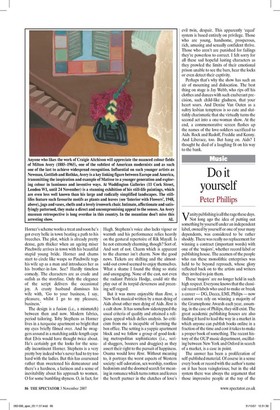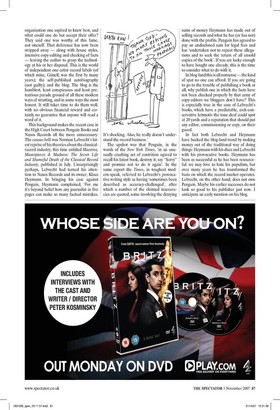Dolt ourself
Peter Phillips Vanity publishing is all the rage these days. Not long ago the idea of putting out something by yourself under an independent label, owned by yourself or one of your many dependents, was considered to be rather shoddy. There was really no replacement for winning a contract (important words) with one of the 'majors', whether record label or publishing house. The acumen of the people who ran these monolithic enterprises was held to be beyond reproach, whose glory reflected back on to the artists and writers they invited to join them.
These 'majors' are no longer held in such high respect. Everyone knows that the classical record labels who used to make or break a career — DG, Decca, EMI, Philips — now cannot even rely on winning a majority of the Gramophone Awards each year, assuming, in the case of Philips, they still exist. The great academic publishing houses are also finding it hard to lead the way in a market in which anyone can publish books online in a fraction of the time and cost it takes to make a proper book of something. The recent history of the OUP music department, oscillating between New York and Oxford in search of a market, is a case in point.
The answer has been a proliferation of self-published material. Of course in a sense every book or record with the author's name on it has been vainglorious; but in the old system there was always the argument that those impressive people at the top of the organisation one aspired to knew best, and what could one do but accept their offer? They said one was worthy of this fame, not oneself. That deference has now been stripped away — along with house styles, intensive copy-editing and checking of facts — leaving the author to grasp the technology at his or her disposal. This is the world of independent one-artist record labels (of which mine, Gime11, was the first by many years); the self-published autobiography (not guilty); and the blog. The blog is the humblest, least conspicuous and least pretentious parade ground of all these modern ways of strutting, and in some ways the most honest. It still takes time to do them well, with no obvious financial reward and certainly no guarantee that anyone will read a word of it.
This background makes the recent case in the High Court between Penguin Books and Naxos Records all the more unnecessary. The causus belli was Norman Lebrecht's latest reprise of his theories about the classicalrecord industry, this time entitled Maestros, Masterpieces & Madness: The Secret Life and Shameful Death of the Classical Record Industry, published in July. Unsurprisingly perhaps, Lebrecht had turned his attention to Naxos Records and its owner, Klaus Heymann. In bringing his case against Penguin, Heymann complained, Tor me it's beyond belief how any journalist in five pages can make so many factual mistakes.
It's shocking. Also, he really doesn't understand the record business.'
The upshot was that Penguin, in the words of the New York Times, 'in an unusually crushing act of contrition agreed to recall his latest book, destroy it, say "Sorry" and promise not to do it again'. In the same report the Times, in toughest modern-speak, referred to Lebrecht's provocative writing style as having 'sometimes been described as accuracy-challenged', after which a number of the claimed inaccuracies are quoted, some involving the dizzying sums of money Heymann has made out of selling records and what he has (or has not) done with the profits. Penguin has agreed to pay an undisclosed sum for legal fees and has 'undertaken not to repeat these allegations and to seek the return of all unsold copies of the book'. If you are lucky enough to have bought one already, this is the time to consider what to do with it.
In blog-land this is all nonsense — the kind of spat no one can afford. If you are going to go to the trouble of publishing a book at all, why publish one in which the facts have not been checked properly by that army of copy-editors we bloggers don't have? This is especially true in the case of Lebrecht's books, which have a predictable, arch-conservative leitmotiv the tone-deaf could spot at 20 yards and a reputation that should put any editor, commissioning or copy, on their guard.
In fact both Lebrecht and Heymann have bucked the blog-land trend by making money out of the traditional way of doing things: Heymann with his discs and Lebrecht with his provocative books. Heymann has been as successful as he has been resourceful: we may love to hate his populism, but over many years he has transformed the basis on which the record market operates. Lebrecht, on the other hand, does not own Penguin. Maybe his earlier successes do not look so good to his publisher just now. I anticipate an early mention on his blog.













































































 Previous page
Previous page